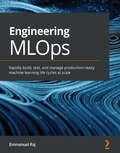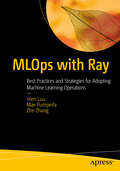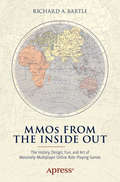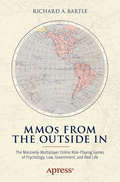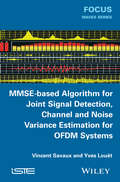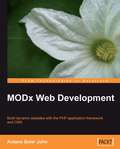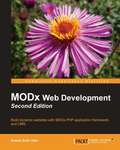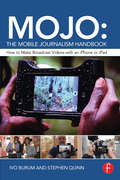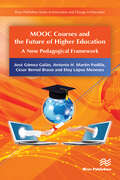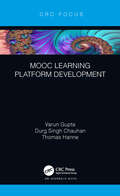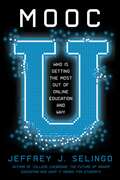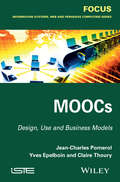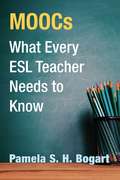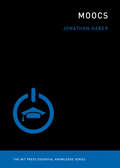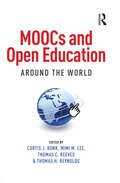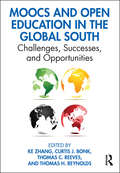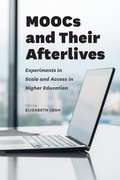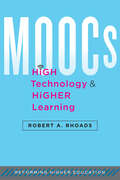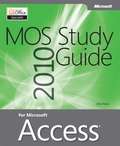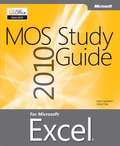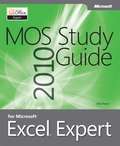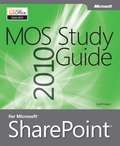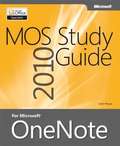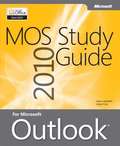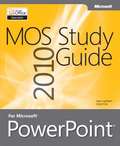- Table View
- List View
MLOps using Azure Machine Learning: Rapidly build, test, and manage production-ready machine learning life cycles at scale
by Emmanuel RajThis book is for data scientists, software engineers, DevOps engineers, and machine learning developers who want to build, deploy, and maintain ML systems in production efficiently using MLOps principles and techniques. Basic knowledge of machine learning is required.
MLOps with Ray: Best Practices and Strategies for Adopting Machine Learning Operations
by Max Pumperla Zhe Zhang Hien LuuUnderstand how to use MLOps as an engineering discipline to help with the challenges of bringing machine learning models to production quickly and consistently. This book will help companies worldwide to adopt and incorporate machine learning into their processes and products to improve their competitiveness. The book delves into this engineering discipline's aspects and components and explores best practices and case studies. Adopting MLOps requires a sound strategy, which the book's early chapters cover in detail. The book also discusses the infrastructure and best practices of Feature Engineering, Model Training, Model Serving, and Machine Learning Observability. Ray, the open source project that provides a unified framework and libraries to scale machine learning workload and the Python application, is introduced, and you will see how it fits into the MLOps technical stack. This book is intended for machine learning practitioners, such as machine learning engineers, and data scientists, who wish to help their company by adopting, building maps, and practicing MLOps. What You'll Learn Gain an understanding of the MLOps discipline Know the MLOps technical stack and its components Get familiar with the MLOps adoption strategy Understand feature engineering Who This Book Is For Machine learning practitioners, data scientists, and software engineers who are focusing on building machine learning systems and infrastructure to bring ML models to production
MMOs from the Inside Out
by Richard A. BartleThis is an astonishing collection of ideas, information, and instruction from one of the true pioneers of Massively-Multiplayer Online Role-Playing Games. MMOs from the Inside Out: The History, Design, Fun, and Art of Massively-Multiplayer Role-playing Games speaks to the designers and players of MMOs, taking it as axiomatic that such games are inspirational and boundless forces for good. The aim of this book is to enthuse an up-coming generation of designers, to inspire and educate players and designers-to-be, and to reinvigorate those already working in the field who might be wondering if it's still all worthwhile. Playing MMOs is about fun, immersion, and identity. Creating MMOs is about imagination, expression, and art. MMOs are so packed with potential that today's examples are little more than small, pioneering colonies on the shore of a vast, uncharted continent. What wonders wait beyond the horizon? What treasures will explorers bring back to amaze us? MMOs from the Inside Out is for people with a spark of creativity: it pours gasoline on that spark. It: Explains what MMOs are, what they once were, and what they could - and should - become. Delves into why players play, and why designers design. Encourages, enthuses, enrages, engages, enlightens, envisions, and enchants. Doesn't tell you what to think, it tells you to think. What you'll learn You'll learn: Myriad ways to improve MMOs - and to decide for yourself whether these are improvements. What MMOs are; who plays them, and why. How MMOs became what they are, and what this means for what they will become. That you have it in you to make MMOs yourself. Who this book is for MMOs from the Inside Out is a book for those who wish to know more about game design in general and MMO design in particular. It's for people who play MMOs, for people who design MMOs, and for people who study MMOs. It's for people with a yearning to see beyond the world around them and to make manifest the worlds of their imagination. Table of Contents Part 1: How Game Developers See MMOs 1. MMO Design Insights 2. MMO Development: Systems and Security 3. MMO Operation: Community and Customer Service 4. Fun, Flow, Immersion, and Presence 5. The Past, Present, and Future of MMOs 6. Understanding MMOs Through Game Studies 7. Player Identity: Who Plays MMOs, Why they Play Them, and How They Play Them 8. The Constraints of Current MMO Production 9. Making a Difference by Reading This Book Part 2: How the World Sees MMOs 10. Understanding the Language of MMOs 11. Society's Demands: A Virtual World's Place in the Real World 12. Society's Concerns: How Non-Gamers See MMO Players 13. The Business of MMOs: How Developers and Players Make Money 14. Government and Law: The Real Legal Issues Around MMOs 15. Morality: Religion and Ethics in MMOs
MMOs from the Outside In
by Richard A. BartleThis follow-up volume to MMOs from the Inside Out is a further collection of bold ideas, information, and instruction from one of the true pioneers of Massively-Multiplayer Online Role-Playing Games. Whereas its predecessor looked at how MMOs can change the world, MMOs from the Outside In: How Psychology, Law, Culture and Real Life see Massively-Multiplayer Role-playing Games looks at how the world can change MMOs - and not always for the better. The aim of this book is to inform an up-coming generation of designers, to alert and educate players and designers-to-be, and to caution those already working in the field who might be growing complacent about society's acceptance of their chosen career. Playing and creating MMOs does not happen in a bubble. MMOs are so packed with potential that those who don't understand them can be afraid, and those who do understand them can neglect their wider impact. Today's examples are little more than small, pioneering colonies on the shore of a vast, uncharted continent. What monsters lurk beyond the horizon? What horrors will explorers bring back to torment us? MMOs from the Outside In is for people with a spark of curiosity: it pours gasoline on that spark. It: * Explains how MMOs are perceived, how they could - and perhaps should - be perceived, and how the can contribute to wider society. * Delves into what researchers think about why players play. * Encourages, enthuses, enrages, engages, enlightens, envisions, and enchants. * Doesn't tell you what to think, it tells you to think. What You Will Learn: * The myriad challenges facing MMOs - and to decide for yourself how to address these challenges. * What MMOs bring to the world that it didn't have before. * How MMOs are regarded, and what this means for how they will be regarded in future. * That playing and designing MMOs has implications for those who don't play or design them. Whom This Book is For: MMOs from the Outside In is a book for those who wish to know more about the wider influence of game design in general and MMO design in particular. It's for people who play MMOs, for people who design MMOs, and for people who study MMOs. It's for people with a yearning to see beyond the worlds of their imagination and to change the world around them.
MMSE-Based Algorithm for Joint Signal Detection, Channel and Noise Variance Estimation for OFDM Systems
by Vincent Savaux Yves LouëtThis book presents an algorithm for the detection of an orthogonal frequency division multiplexing (OFDM) signal in a cognitive radio context by means of a joint and iterative channel and noise estimation technique. Based on the minimum mean square criterion, it performs an accurate detection of a user in a frequency band, by achieving a quasi-optimal channel and noise variance estimation if the signal is present, and by estimating the noise level in the band if the signal is absent. Organized into three chapters, the first chapter provides the background against which the system model is presented, as well as some basics concerning the channel statistics and the transmission of an OFDM signal over a multipath channel. In Chapter 2, the proposed iterative algorithm for the noise variance and the channel estimation is detailed, and in Chapter 3, an application of the algorithm for the free-band detection is proposed. In both Chapters 2 and 3, the principle of the algorithm is presented in a simple way, and more elaborate developments are also provided. The different assumptions and assertions in the developments and the performance of the proposed method are validated through simulations, and compared to methods of the scientific literature
MODx Web Development
by Antano Solar JohnThis book is an example-driven tutorial, which will take you from the installation of MODx through to configuration, customization, and deployment. Step-by-step instructions will enable you to build a fully-functional, feature-rich website quickly and without any programming language. This book is ideal for those who want to learn to use MODx. Both beginner and experienced web developers will benefit from this comprehensive guide to MODx. No knowledge of PHP programming or any templating language is needed, but the more advanced chapters towards the end of the book will allow more confident developers to extend their applications even further by creating their own snippets.
MODx Web Development - Second Edition
by Antano Solar JohnThis book is an example-driven tutorial, which will take you from the installation of MODx through to configuration, customization, and deployment. Step-by-step instructions will enable you to build a fully-functional, feature-rich website quickly and without the knowledge of any programming language.This book is ideal for newcomers to MODx. Both beginners and experienced web developers will benefit from this comprehensive guide to MODx. No knowledge of PHP programming or any templating language is needed, but the more advanced chapters towards the end of the book will allow more confident developers to extend their applications even further by creating their own snippets.
MOJO: How to Make Broadcast Videos with an iPhone or iPad
by Stephen Quinn Ivo BurumMOJO: The Mobile Journalism Handbook is the first book devoted specifically to training citizens, journalism students and media professionals to produce professional-quality videos with only a mobile device. As journalism becomes increasingly competitive, students and emerging professionals need a broader skillset to make themselves more employable, whether as mainstream or entrepreneurial journalists. This book by Dr. Ivo Burum and Dr. Stephen Quinn, world experts in mobile journalism, provides comprehensive coverage of all the skills and practices needed to be a mobile journalist. Key features: Burum and Quinn underline the importance of story and storytelling, the crucial context journalists always need to keep in mind. Other books and tutorials merely offer step-by-step guidance to mobile technology and apps. The book synthesizes the knowledge and more than 70 years of combined expertise of two of the world’s leading mobile journalism practitioners, offering sage advice and tips from people who have trained mojos in more than 20 countries. Companion Website: How-to videos on the companion website offer powerful ways for learners to absorb the content easily, walking them through the key mojo components of research, shooting, scripting, voice-over, editing and post-production. www.routledge.com/cw/burum Ivo Burum is an award-winning writer, director and television executive producer. He has more than 30 years’ experience working across genres including frontline international current affairs. A pioneer in UGS creation, Dr. Burum lectures in multimedia journalism. This is his second book about mojo. He runs Burum Media, a mojo and web TV consultancy that provides training for journalists, educators and remote communities internationally. Stephen Quinn was a journalist for 20 years before he became a university professor in 1996. Dr. Quinn taught journalism in five countries until he returned to journalism in 2011 in Hong Kong. His UK-based company MOJO Media Insights trains mobile journalists around the world. This is his twenty-first print book. He has also produced 5 iBooks. He co-writes a weekly column syndicated to seven countries.
MOOC Courses and the Future of Higher Education: A New Pedagogical Framework
by José Gómez Galán Antonio H. Padilla César Bernal BravoDuring the last decades, our society is witnessing an authentic revolution that, in a dizzying manner has deeply influenced, modified, and transformed the way of life of human beings. This constant and unstoppable revolution is transmuting all areas of our life: social, cultural, personal, labor, economic, training, etc. This new society is characterized by a high generation of knowledge and the constant and fluid processing of information. In this macro-context, the MOOC phenomenon emerged. MOOC (Massive Open Online Courses) courses are based on the principles of massive, free access to all materials and resources offered online. This new didactic path can be constituted in an innovative techno-social tendency, especially oriented in the panorama of Higher Education to stimulate university improvement, open opportunities at the same time for education and training or, simply, derive towards a new business model for the universities. In addition to being an entry point for the popularization of science and knowledge, the future possibilities are enormous and are being studied in all their various dimensions. Many initiatives as a result have been developed to implement this new form of education. MOOC Courses and the Future of Higher Education presents the latest research theories and current examples of MOOC courses practices in Higher Education. The chapters represent an extensive assortment of interpretations and practices examples of MOOC courses, across areas as varied as teaching methodologies, instructional innovations, educational technology, etc. This work is structured in three sections, the first one covers the university institution in the knowledge society, the second analyzes the MOOC training proposals, and the third discusses the future role of MOOCs. Technical topics discussed in the book include: The Virtualization of Teaching in Higher EducationTraining and Professional Development at the e-UniversityTaxonomy of MOOCsMOOC: Strengths and WeaknessesMOOCs and the Scientific Community: Challenges and InnovationMOOC PlatformsDirectory of MOOC ResourcesMOOC: Reflections of the Future
MOOC Learning Platform Development
by Thomas Hanne Varun Gupta Durg Singh ChauhanThe work presented in this book is based on empirical study undertaken as a case study to understand the challenges faced in massively open online course (MOOC) based learning and experimentation to understand the challenges for presenting theoretical and practical courses. The book proposes a flexible online platform. This solution provides flexibility in distance learning processes including course enrollment, learning, evaluation, and outcome of degrees. The proposed system not only gives students freedom to choose their courses in accordance with their needs but also use earned credit towards online degrees of any university of their choice.
MOOC U: Who Is Getting the Most Out of Online Education and Why
by Jeffrey J. SelingoMOOC U. explains why you should sign up for massive open online course (MOOC) and how you can get the greatest benefit from the courses. It does so by telling a story--the story of a single MOOC: University of Virginia Professor Ed Hess's "Grow to Greatness."<P> Higher education expert and award-wining author Jeffrey J. Selingo captures in four perspectives--the student's, the professor's, the university's, and the online course provider's--why today's average MOOC student can benefit tremendously from MOOCs, if they only know a bit about how to navigate the MOOC universe. MOOC U. provides a path to success for the six million and rising students who have signed up for a free online course.<P> A few years ago, Massive Open Online Courses (MOOCs) were heralded as higher education's savior. They would provide free, high quality education to remote villages around the world and those shut out of world-class universities. That remains a compelling vision, but one that is at odds with the hopes and plans of the majority of people who have signed up for a MOOC since 2011. Most of them are college graduates using MOOCs as a supplement to formal classroom learning and a tool for professional development. For these students, learning to use MOOCs as an instrument for learning, more like a textbook, rather than a replacement for college provides rich opportunities and immediate rewards.<P> The problem is that there are no guidebooks for prospective MOOC students like the hundreds that exist for the bricks-and-mortar world of college. MOOC U. is meant to be that guidebook: an explanation of the confusing web of MOOC players, the far-flung classmates, the professors, and most of all, how to determine quality in this new ecosystem. By following one MOOC course, the book lays out the issues and challenges of MOOCs through the personal stories of the people in the action.
MOOCs
by Jean-Charles Pomerol Yves Epelboin Claire ThouryMOOCs (Massive Online Open Courses) are shaking up the traditional forms of primary and continuing education and training. These new distance teaching tools which take advantage of the Web and social network revolution are making us think again about how we teach and learn.n amazing tool for life-long training?* Is there a business model for developing MOOCs?
MOOCs (Kindle Single): What Every ESL Teacher Needs to Know
by Pamela S. Bogart"We have an opportunity as ESL teachers to help our students plug in to what MOOCs can offer today: a supplementary space in which to develop vocabulary and text-based conversational skills and to learn foundational content in domains of interest at an individual pace in a non-threatening, low-stakes environment." --- Pamela S.H. Bogart In this e-single, Bogart, an instructor at the University of Michigan's English Language Institute, explains the ins and outs of MOOCs, particularly (but not exclusively) those that can support language learning. She explains the various types of MOOCs and their pedagogical benefits and shows how MOOCs can aid in the language learning process and offer students a more richly textured blended learning experience. The text concludes with tips for creating and designing a MOOC. Essentially, this short ebook answers many of the questions today's teachers might have about, not only whether to use MOOCs in the classroom, but whether they should create one. The book seeks to provide answers to: *What is a MOOC? *How can my students best use MOOCs? *What if I am asked to or decide to create a MOOC? Each section includes an Exploration Task that invites readers to deepen their personal understanding of and experience with MOOCs.
MOOCs (The MIT Press Essential Knowledge series)
by Jonathan HaberEverything you always wanted to know about MOOCs: an account of massive open online courses and what they might mean for the future of higher education.The New York Times declared 2012 to be “The Year of the MOOC” as millions of students enrolled in massive open online courses (known as MOOCs), millions of investment dollars flowed to the companies making them, and the media declared MOOCs to be earth-shaking game-changers in higher education. During the inevitable backlash that followed, critics highlighted MOOCs' high dropout rate, the low chance of earning back initial investments, and the potential for any earth-shaking game change to make things worse instead of better. In this volume in the Essential Knowledge series, Jonathan Haber offers an account of MOOCs that avoids both hype and doomsaying. Instead, he provides an engaging, straightforward explanation of a rare phenomenon: an education innovation that captures the imagination of the public while moving at the speed of an Internet startup.Haber explains the origins of MOOCs, what they consist of, the controversies surrounding them, and their possible future role in education. He proposes a new definition of MOOCs based on the culture of experimentation from which they emerged, and adds a student perspective—missing in most MOOC discussion. Haber's unique Degree of Freedom experiment, during which he attempted to learn the equivalent of a four-year liberal arts degree in one year using only MOOCs and other forms of free education, informs his discussion.Haber urges us to avoid the fallacy of thinking that because MOOCs cannot solve all educational challenges they are not worth pursuing, and he helps us understand what MOOCs—despite their limitations—still offer the world. His book is required reading for anyone trying to sort out the competing claims, aspirations, and accusations that color the MOOC debate.
MOOCs and Open Education Around the World
by Thomas C. Reeves Curtis J. Bonk Mimi M. Lee Thomas H. ReynoldsAs new digital forms of formal and informal learning proliferate, there is an increasing need to better understand how people in different regions of the world are implementing massive open online courses (MOOCs) and other forms of open educational resources (OERs). Educators, researchers, politicians, and numerous other stakeholders want to grasp what the outcomes of these initiatives are and how they can be improved. Ongoing e-learning developments related to both technology and pedagogy have pushed institutions and organizations to grapple with issues of accreditation, credentialing, quality standards, innovative assessment, and learner motivation and attrition, among other areas of concern. In response, MOOCs and Open Education Around the World explores and illuminates unique implementations of MOOCs and open education across regions and nations. The book also focuses on the various opportunities as well as the dilemmas presented in this rapidly evolving age of technology-enabled learning. What are the different delivery formats, interaction possibilities, assessment schemes, and business models? What are the key controversies or issues that must be discussed and addressed? This edited collection explains MOOCs and open education trends and issues in a variety of contexts, shares key research findings, and provides practical suggestions and recommendations for the near future.
MOOCs and Open Education in the Global South: Challenges, Successes, and Opportunities
by Thomas C. Reeves Ke Zhang Thomas H. Reynolds Curt BonkWith e-learning technologies evolving and expanding at high rates, organizations and institutions around the world are integrating massive open online courses (MOOCs) and other open educational resources (OERs). MOOCs and Open Education in the Global South explores the initiatives that are leveraging these flexible systems to educate, train, and empower populations previously denied access to such opportunities. Featuring contributors leading efforts in rapidly changing nations and regions, this wide-ranging collection grapples with accreditation, credentialing, quality standards, innovative assessment, learner motivation and attrition, and numerous other issues. The provocative narratives curated in this volume demonstrate how MOOCs and OER can be effectively designed and implemented in vastly different ways in particular settings, as detailed by experts from Asia, Latin America, the Middle East, Africa, the Pacific/Oceania, and the Caribbean. This comprehensive text is an essential resource for policy makers, instructional designers, practitioners, administrators, and other MOOC and OER community stakeholders.
MOOCs and Their Afterlives: Experiments in Scale and Access in Higher Education
by Elizabeth LoshA trio of headlines in the Chronicle of Higher Education seem to say it all: in 2013, “A Bold Move Toward MOOCs Sends Shock Waves;” in 2014, “Doubts About MOOCs Continue to Rise,” and in 2015, “The MOOC Hype Fades.” At the beginning of the 2010s, MOOCs, or Massive Open Online Courses, seemed poised to completely revolutionize higher education. But now, just a few years into the revolution, educators’ enthusiasm seems to have cooled. As advocates and critics try to make sense of the rise and fall of these courses, both groups are united by one question: Where do we go from here? Elizabeth Losh has gathered experts from across disciplines—education, rhetoric, philosophy, literary studies, history, computer science, and journalism—to tease out lessons and chart a course into the future of open, online education. Instructors talk about what worked and what didn’t. Students share their experiences as participants. And scholars consider the ethics of this education. The collection goes beyond MOOCs to cover variants such as hybrid or blended courses, SPOCs (Small Personalized Online Courses), and DOCCs (Distributed Open Collaborative Course). Together, these essays provide a unique, even-handed look at the MOOC movement and will serve as a thoughtful guide to those shaping the next steps for open education.
MOOCs, High Technology, and Higher Learning (Reforming Higher Education: Innovation and the Public Good)
by Robert A. RhoadsThe first book to explore the rise of MOOCs through a social science lens.In MOOCs, High Technology, and Higher Learning, Robert A. Rhoads places the OpenCourseWare (OCW) movement into the larger context of a revolution in educational technology. In doing so, he seeks to bring greater balance to increasingly polarized discussions of massively open online courses (MOOCs) and show their ongoing relevance to reforming higher education and higher learning.Rhoads offers a provocative analysis of a particular moment in history when cultural, political, and economic forces came together with evolving teaching and learning technologies to bring about the MOOC. He argues persuasively that the OCW and MOOC movements have had a significant impact on the digitalization of knowledge and that they have helped expand the ways students and teachers interact and develop ideas collaboratively. He also critically analyzes the extensive media coverage of MOOCs while examining empirical studies of MOOC content delivery, the organizational system supporting the OCW/MOOC movement, and faculty labor concerns.Too often, technology advocates champion the MOOC movement as a solution to higher education’s challenges without recognizing the pedagogical, social, and economic costs. MOOCs, High Technology, and Higher Learning challenges many of the democratic claims made by MOOC advocates, pointing to vast inequities in the ways MOOCs are presented as an alternative to brick-and-mortar access for low-income populations. This book offers a clear-eyed perspective on the potential and peril of this new form of education.
MOS 2010 Study Guide for Microsoft® Access®
by John PierceDemonstrate your expertise with Microsoft Access by earning a MOS 2010 certification. This Study Guide is designed to help you practice and prepare for Exam 77-885: Access 2010, and features:Full objective-by-objective review Procedures and hands-on practice tasks Ready-made, downloadable practice files Exam-discount Use the in-depth exam prep, practice, and review to help advance your proficiency with Access 2010--and earn the credential that proves it! NOTE: This same content is also available as part of the MOS 2010 Study Guide for Microsoft Word Expert, Excel Expert, Access, & SharePoint Exams (ISBN 9780735657885)
MOS 2010 Study Guide for Microsoft® Excel®
by Joan Lambert Joyce CoxDemonstrate your expertise with Microsoft Excel by earning a MOS 2010 certification. This Study Guide is designed to help you practice and prepare for Exam 77-882: Excel 2010, and features:Full objective-by-objective review Procedures and hands-on practice tasks Ready-made, downloadable practice files Exam-discount Use the in-depth exam prep, practice, and review to help advance your proficiency with Excel 2010--and earn the credential that proves it! NOTE: This same content is also available as part of the MOS 2010 Study Guide for Microsoft Word, Excel, PowerPoint, and Outlook Exams (ISBN 9780735648753)
MOS 2010 Study Guide for Microsoft® Excel® Expert
by John PierceDemonstrate your expertise with Microsoft Excel by earning a MOS 2010 certification. This Study Guide is designed to help you practice and prepare for Exam 77-888: Excel 2010 Expert, and features:Full objective-by-objective review Procedures and hands-on practice tasks Ready-made, downloadable practice files Exam-discount Use the in-depth exam prep, practice, and review to help further advance your proficiency with Excel 2010--and earn the expert-level credential that proves it! NOTE: This same content is also available as part of the MOS 2010 Study Guide for Microsoft Word Expert, Excel Expert, Access, & SharePoint Exams (ISBN 9780735657885)
MOS 2010 Study Guide for Microsoft® Office SharePoint®
by Geoff EvelynDemonstrate your expertise with Microsoft SharePoint by earning a MOS 2010 certification. This Study Guide is designed to help you practice and prepare for Exam 77-886: SharePoint 2010, and features: Full objective-by-objective review Procedures and hands-on practice tasks Exam-discount Use the in-depth exam prep, practice, and review to help advance your proficiency with SharePoint 2010--and earn the credential that proves it! NOTE: This same content is also available as part of the MOS 2010 Study Guide for Microsoft Word Expert, Excel Expert, Access, & SharePoint Exams (ISBN 9780735657885)
MOS 2010 Study Guide for Microsoft® OneNote®
by John PierceDemonstrate your expertise with Microsoft OneNote 2010 by earning a MOS certification. This official Study Guide is designed to help you practice and prepare for MOS Exam 77-853: OneNote 2010, and features: Full objective-by-objective coverage Procedures and hands-on practice tasks Ready-made, downloadable practice files Exam-discount offer from Certiport Use the in-depth exam prep, practice, and review to help advance your proficiency with OneNote 2010--and earn the credential that proves it!e inside
MOS 2010 Study Guide for Microsoft® Outlook®
by Joan Lambert Joyce CoxDemonstrate your expertise with Microsoft Outlook by earning a MOS 2010 certification. This Study Guide is designed to help you practice and prepare for Exam 77-884: Outlook 2010, and features:Full objective-by-objective review Procedures and hands-on practice tasks Ready-made, downloadable practice files Exam-discount Use the in-depth exam prep, practice, and review to help advance your proficiency with Outlook 2010--and earn the credential that proves it! NOTE: This same content is also available as part of the MOS 2010 Study Guide for Microsoft Word, Excel, PowerPoint, and Outlook Exams (ISBN 9780735648753)
MOS 2010 Study Guide for Microsoft® PowerPoint®
by Joan Lambert Joyce CoxDemonstrate your expertise with Microsoft PowerPoint by earning a MOS 2010 certification. This Study Guide is designed to help you practice and prepare for Exam 77-883: PowerPoint 2010, and features: Full objective-by-objective review Procedures and hands-on practice tasks Ready-made, downloadable practice files Exam-discount Use the in-depth exam prep, practice, and review to help advance your proficiency with PowerPoint 2010--and earn the credential that proves it! NOTE: This same content is also available as part of the MOS 2010 Study Guide for Microsoft Word, Excel, PowerPoint, and Outlook Exams (ISBN 9780735648753)
